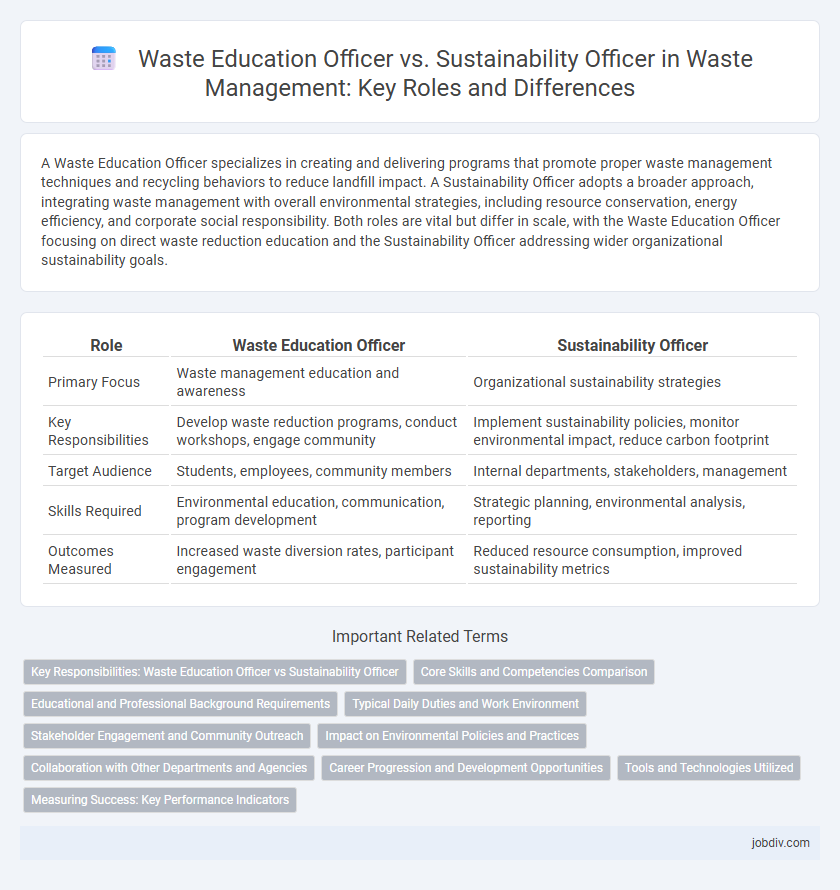A Waste Education Officer specializes in creating and delivering programs that promote proper waste management techniques and recycling behaviors to reduce landfill impact. A Sustainability Officer adopts a broader approach, integrating waste management with overall environmental strategies, including resource conservation, energy efficiency, and corporate social responsibility. Both roles are vital but differ in scale, with the Waste Education Officer focusing on direct waste reduction education and the Sustainability Officer addressing wider organizational sustainability goals.
Table of Comparison
| Role | Waste Education Officer | Sustainability Officer |
|---|---|---|
| Primary Focus | Waste management education and awareness | Organizational sustainability strategies |
| Key Responsibilities | Develop waste reduction programs, conduct workshops, engage community | Implement sustainability policies, monitor environmental impact, reduce carbon footprint |
| Target Audience | Students, employees, community members | Internal departments, stakeholders, management |
| Skills Required | Environmental education, communication, program development | Strategic planning, environmental analysis, reporting |
| Outcomes Measured | Increased waste diversion rates, participant engagement | Reduced resource consumption, improved sustainability metrics |
Key Responsibilities: Waste Education Officer vs Sustainability Officer
Waste Education Officers focus on developing and delivering educational programs focused on waste reduction, recycling, and community engagement to promote sustainable waste management practices. Sustainability Officers oversee broader organizational sustainability strategies, including waste management, energy efficiency, resource conservation, and regulatory compliance. Key responsibilities of Waste Education Officers emphasize public awareness and behavioral change, while Sustainability Officers integrate waste management into holistic environmental and corporate sustainability initiatives.
Core Skills and Competencies Comparison
A Waste Education Officer specializes in community outreach, developing educational programs, and raising awareness about waste reduction and recycling practices, requiring strong communication, teaching abilities, and knowledge of local waste management policies. In contrast, a Sustainability Officer focuses on integrating sustainable practices across organizational operations, demanding skills in environmental auditing, strategic planning, and compliance with environmental regulations. Both roles require analytical thinking and project management, but the Waste Education Officer emphasizes behavior change and public engagement, while the Sustainability Officer prioritizes organizational sustainability performance and policy implementation.
Educational and Professional Background Requirements
Waste Education Officers typically hold degrees in environmental science, education, or waste management, complemented by certifications in waste reduction techniques and community outreach skills. Sustainability Officers often possess advanced qualifications in environmental sustainability, business administration, or engineering, paired with professional experience in corporate sustainability strategies and regulatory compliance. Both roles demand strong communication abilities, but Sustainability Officers require a broader understanding of environmental policies and strategic planning frameworks.
Typical Daily Duties and Work Environment
A Waste Education Officer typically conducts community outreach, develops educational programs on waste reduction, and collaborates with local authorities to promote recycling initiatives. In contrast, a Sustainability Officer focuses on integrating sustainable practices across an organization, managing environmental impact assessments, and ensuring compliance with environmental regulations. Both roles operate in diverse settings such as government agencies, educational institutions, or corporate environments, often requiring fieldwork, stakeholder engagement, and data analysis.
Stakeholder Engagement and Community Outreach
A Waste Education Officer specializes in developing targeted programs to educate communities on proper waste management practices, often collaborating with local schools, businesses, and municipal agencies to promote recycling and reduction initiatives. In contrast, a Sustainability Officer oversees broader environmental strategies, integrating waste reduction efforts into overall corporate social responsibility goals while engaging a diverse range of stakeholders including suppliers, customers, and policymakers to foster sustainable practices. Both roles require strong stakeholder engagement and community outreach skills, but the Waste Education Officer primarily focuses on behavior change in specific audiences related to waste, whereas the Sustainability Officer drives systemic environmental improvements across organizational operations.
Impact on Environmental Policies and Practices
Waste Education Officers play a crucial role in shaping environmental policies by raising awareness and promoting waste reduction practices among communities and organizations. Sustainability Officers influence broader environmental strategies by integrating waste management into corporate sustainability goals, driving systemic changes in resource use and environmental impact. Both roles contribute significantly to advancing environmental policies, with Waste Education Officers focusing on behavioral change and Sustainability Officers on strategic implementation.
Collaboration with Other Departments and Agencies
Waste Education Officers collaborate closely with environmental health, facilities management, and local government agencies to implement targeted recycling and waste reduction programs. Sustainability Officers engage cross-departmentally with procurement, energy management, and corporate social responsibility teams to integrate sustainable practices across organizational operations. Both roles require strong interdepartmental communication and partnership with external regulatory bodies to achieve comprehensive environmental goals.
Career Progression and Development Opportunities
Waste Education Officers specialize in community engagement and awareness programs, building expertise in behavioral change and regulatory compliance, which can lead to roles such as Waste Management Coordinator or Environmental Outreach Manager. Sustainability Officers possess a broader scope, integrating waste reduction strategies within corporate sustainability frameworks, often progressing to Sustainability Managers or Chief Sustainability Officers with strategic planning and policy development responsibilities. Career development for both paths benefits from certifications like LEED or ISSP and advanced degrees in environmental science or sustainability management.
Tools and Technologies Utilized
Waste Education Officers primarily utilize educational software, waste tracking apps, and interactive digital platforms to engage communities and promote effective waste management practices. Sustainability Officers employ advanced data analytics tools, lifecycle assessment software, and environmental management systems to optimize resource use and reduce environmental impact across organizations. Both roles integrate Geographic Information Systems (GIS) and real-time monitoring technologies to enhance decision-making and track sustainability goals.
Measuring Success: Key Performance Indicators
Waste Education Officers track success through metrics such as reduction in waste generation rates, increased participation in recycling programs, and improved community awareness levels. Sustainability Officers measure success using broader indicators including carbon footprint reduction, resource efficiency improvements, and integration of sustainable practices across organizational operations. Both roles rely on data-driven KPIs to assess impact, but Waste Education Officers focus more on behavioral changes, while Sustainability Officers evaluate systemic environmental outcomes.
Waste Education Officer vs Sustainability Officer Infographic

 jobdiv.com
jobdiv.com